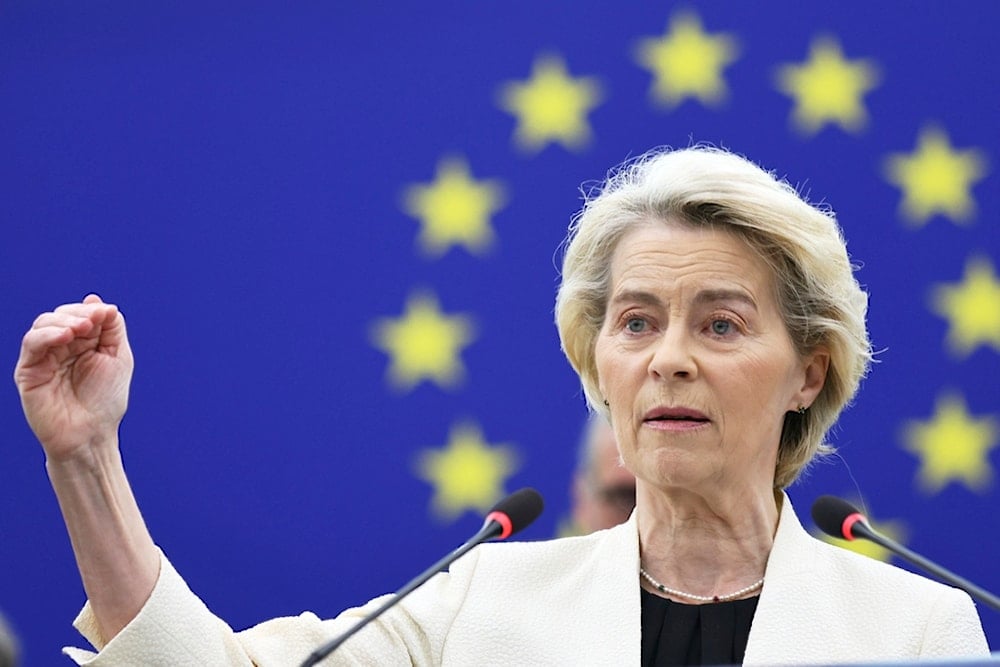Von der Leyen faces no-confidence motion amid Pfizergate fallout: FT
European Commission President Ursula von der Leyen is facing a no-confidence motion in Parliament amid growing cross-party criticism over her handling of COVID-19 vaccine negotiations, transparency failures in the Pfizergate scandal, and accusations of bypassing democratic procedures.
-

European Commission President Ursula Von der Leyen delivers her speech on EU support for peace in Ukraine, Wednesday, May 7, 2025, at the European Parliament in Strasbourg, eastern France. (AP Photo/Antonin Utz)
The Financial Times reported on Thursday that European Commission President Ursula von der Leyen is facing a no-confidence motion in the European Parliament, triggered by deepening concerns over her leadership style, lack of transparency, and growing accusations of bypassing democratic norms within the EU's institutional framework.
The initiative, launched by Romanian far-right MEP Gheorghe Piperea, stems from the ongoing “Pfizergate” scandal, which escalated in May when the EU General Court issued a landmark ruling against the Commission for failing to disclose text messages exchanged between von der Leyen and Pfizer CEO Albert Bourla during COVID-19 vaccine procurement talks.
The case traces back to 2021, when von der Leyen herself admitted in an interview for The New York Times to personally texting Bourla during negotiations over a €35 billion vaccine deal. Transparency advocates later filed access requests, but the Commission claimed the messages “could not be found,” arguing they were “short-lived” and not subject to archiving.
The court rejected that explanation as lacking legal credibility and ruled that the Commission had breached Article 41 of the EU Charter of Fundamental Rights, which guarantees the right to good administration. Legal experts noted this may be the first time the court has used that article to censure institutional opacity at the highest level.
The ruling, which followed a The New York Times lawsuit for access to the messages, has intensified calls for reform in how the EU handles digital communications and record-keeping, raising broader concerns about democratic oversight and the legitimacy of policy decisions made through informal channels like private messaging apps.
"The court found the commission's refusal legally unsound and lacking credible justification," Piperea said, adding that the case reflects "a continued pattern of institutional over-reach, democratic disregard, and erosion of public trust in the Union's governance."
In defense of the motion, Piperea stated, "The initiative is fundamentally about upholding transparency and ensuring a fair and genuine democratic process." He claimed to have secured more than the 72 required signatures to table the vote and asserted that even members of von der Leyen's own European People's Party (EPP) were offering support.
While he acknowledged that the motion is unlikely to achieve the two-thirds supermajority needed to oust the Commission, he stressed its symbolic weight as "a crucial opportunity for constructive and substantiated criticism towards von der Leyen. It obliges the commission to address concerns and provide justifications."
Policy backlash
The Pfizergate episode has only amplified broader discontent already simmering across party lines. Last week, von der Leyen's Commission abruptly withdrew a proposed law aimed at banning greenwashing, just days before final negotiations with Parliament and member states. The sudden reversal was condemned by multiple political groups, including her own allies. Members of the Socialist and Renew Europe blocs sent a joint letter to Parliament President Roberta Metsola, urging institutional accountability. "We also consider that the responsible commissioners should be summoned to the respective committees to explain their intentions," they wrote.
The Greens, who initially supported von der Leyen's presidency, also expressed sharp disapproval. Their frustration was echoed by several EU capitals, where diplomats warned that the Commission's decision to walk away from finalized legislative texts undermines the EU's credibility as a lawmaking body. Commission Vice-President Teresa Ribera acknowledged the political fallout, saying: "I hope that these messy days can be clarified as soon as possible and that we can reach a consensus."
Read more: Pfizer CEO escaped questions at Davos about effect of Covid vaccine
Meanwhile, the Commission is facing another legal challenge from within the Parliament itself. Its Legal Affairs Committee has voted to ask President Metsola to consider legal action against the Commission over its decision to issue additional EU debt for military spending, without full parliamentary consultation. Piperea's motion cites this as further evidence of "procedural abuse."
Concluding his appeal, Piperea called on the Commission to step down, citing "repeated failures to ensure transparency, persistent disregard for democratic oversight and the rule of law within the Union."
Though the no-confidence vote is widely expected to fail, its political implications are significant. It exposes growing dissatisfaction across ideological lines and raises questions about von der Leyen's ability to unify Parliament as she eyes a second term. A spokesperson for the Parliament declined to comment on the matter.

 4 Min Read
4 Min Read










